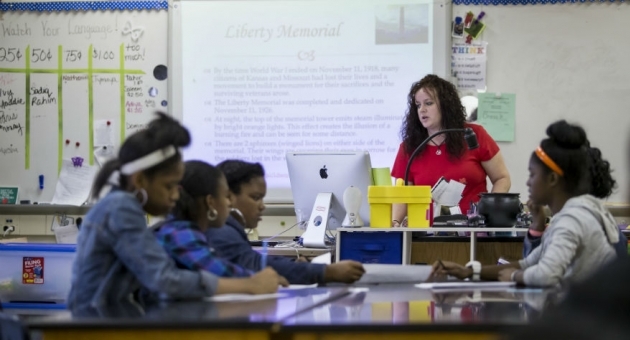Temple awarded $2.2M grant to establish middle grades teacher residency

The College of Education received $2.2 million in grant funding from the U.S. Department of Education to create a new partnership between the university and the School District of Philadelphia.
Funding from the grant will support the creation of the Temple Teacher Residency program—a new dual-degree program focused on science, technology, engineering and math (STEM).
The Temple Teacher Residency will enable students who earn a bachelor’s degree in a STEM-related discipline to earn a master’s degree in middle-grades education by completing an additional year in residency in a Philadelphia charter or public school.
The program, which is built on the concept of a medical residency program, was developed in close partnership with the School District of Philadelphia. In their graduate year, students will spend 75 percent of their time teaching in a middle-grades classroom while receiving direction from a school-based cooperating teacher and a university-based coach.
“This is one of several options toward obtaining teacher certification at Temple,” said Wanda Brooks, associate dean of teacher education and the director of the Temple Teacher Residency program. “Offering deep and extended school-based experiences through a residency model is an innovative way of training teachers that has gained traction across the county.”
According to a study completed by the Urban Teacher Residency United Network, roughly 50 percent of all urban public school teachers nationwide leave their positions in fewer than three years—not because they don’t want to teach, but because they’re not always ready.
“A residency allows us to fully immerse our Temple student teachers in schools before they enter as new teachers,” said Brooks. “It will provide practical learning along with the professional support network new teachers should ideally have to become effective educators.”
Placing student teachers in an urban environment may help them to be more effective teachers, said Gregory Anderson, dean of the College of Education.
“In both urban and suburban districts teachers have to manage issues related to diversity, variations in socioeconomic status, English language learners—all of these issues are becoming more and more relevant as the demographic continues to shift in this country.”
The award is one of 24 given this year by the Teacher Quality Partnership (TQP) Grant Program that President Barack Obama announced in May at the White House Science Fair. TQP aims to increase student achievement by improving the quality of new, prospective teachers. The four-year grant starts with a planning year, and students will be eligible to enroll during the 2015-2016 school year. It will support approximately 50-55 students.
“Once the funding is complete, we hope that this residency program becomes an integral part of the university and a sustainable pathway for preparing new teachers in the middle grades,” said Brooks.